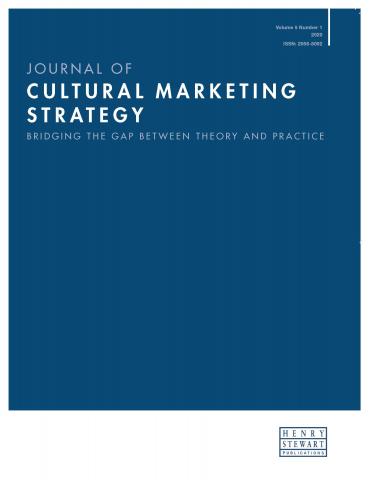"Time is a very precious commodity to all industry practitioners in operations and making time in a busy schedule to attend seminars and market events is extremely difficult. This journal brings thought-provoking articles and peer opinions to your desk and enables the time-constrained practitioner to gain an insight into market issues covering a wide range of topics. There are only a few journals with an operational focus; being peer reviewed ensures it has relevance and worth reading."
The metonymy of #BlackTwitter: The effect of urban identification on hashtag activism
Click the button below to download the full text of the article.
Abstract: ‘Black Twitter’ is the moniker for the cultural identity of African American Twitter users, the influence of which is spreading from mainstream Twitter to society-atlarge. To investigate the influence of Black Twitter, this study posits a model of subcultural capital, conceptualising the knowledge, experience and skills that accompany hierarchy and influence within Black Twitter. Subcultural capital can be garnered in three ways: embodied, objectified and institutionalised. The study finds that the transcending, cross-cultural psychographic of urban identification is the requisite embodied capital that significantly predicts the number of tweets (objectified capital) within Black Twitter. The number of followers a Black Twitter user has (institutionalised capital) statistically mediates the relationship between urban identification and number of tweets. Contrary to intuitive belief, ethnic identity — as embodied capital — is a nonsignificant predictor of objectified and institutionalised capital within Black Twitter. This paper contributes to the marketing psychology literature by positing urban identification within a model of multicultural social media consumption. It concludes that for multicultural marketing via Twitter, the combination of urban identification, followers and tweets, is a better basis for segmentation than race and ethnicity. The paper also discusses managerial implications and additional theoretical considerations.
Keywords: social media, Twitter, Black Americans, race, hip-hop influence, social influence
J.P. James is an assistant professor of marketing in the Bertolon School of Business at Salem State University. He holds a master’s degree in integrated marketing communication from Northwestern University and a PhD from Rutgers Business School. Dr James researches multicultural marketing and marketplace diversity and his work has been published in the Journal of Public Policy & Marketing and Journal of Management Policy and Practice. Prior to pursuing a PhD, Dr James was an executive in the advertising industry



